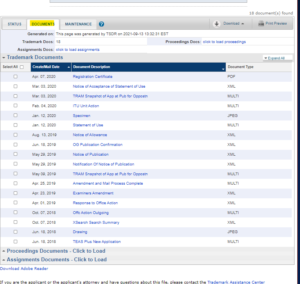When you apply for a trademark, your filing becomes a part of the public record. That means anyone can find out basic information about you, your contact details (including your address and email address listed on the filing) and very specific details about your filings such as your initial application dates and renewal deadlines.
Unfortunately, the ease of finding this information means that you may also become the target of scammers. The United States Patent and Trademark Office (USPTO) has reported a historic increase in third parties seeking to impersonate the USPTO and defraud consumers of their money. The USPTO has a page on their website dedicated to these scams: Caution: Scam Alert
These scams take a variety of forms but here are the most common to be aware of during the application process and after you are granted approval of your mark:
Pending Cancellation Notices: We have seen very official-looking notices that appear to be from the USPTO with accurate and inaccurate renewal dates on the letter. They instruct the trademark holder that in order to renew their mark, they need to fill out the form and send in a fee. These forms can be very deceiving so it’s important to look more closely at the sender and the mailing address. Before you send any fees to anyone, check the status of your application/registration on the USPTO’s Trademark Status & Document Retrieval and contact your lawyer. In TSDR you can check the dues dates for your renewals:

Emails demanding special registrations from the USPTO: The USPTO has found that third parties are using spoof emails (ex. [email protected]) to ask trademark holders to update personal information or join separate client registries with a penalty for not complying. The USPTO tells consumers very clearly on their website that if you receive an email that claims to be from the agency, you can verify the legitimacy of it by going to their Trademark Status & Document Retrial database and enter the trademark application or registration number. Your TSDR file will show all outgoing communication from the USPTO (see image below). If the letter you received does NOT appear there, it most likely was a scam.
Misleading trademark offers: Some solicitations that target trademark consumers are not necessarily scams, but deceptive offers. You may be asked to utilize a legitimate service, but it is not made clear that the service is optional and not required at all to secure, maintain or protect your trademark. Some of these misleading services include offers to record your marks in a private registry or asking for invoice fees for putting publishing your trademark in a catalog. Before you pay any invoice or choose to use a service that you think is required of you as part of the trademark registration or renewal process, run it by your lawyer to see if it’s necessary.

Trademark scams look official and can make you feel as though you are in jeopardy of losing your mark or missing a key deadline if you don’t pay the requested fee. If you get one, don’t panic. Email a copy over to your lawyer and let him or her evaluate the legitimacy of the offer. If you don’t have a lawyer, you can log on to your account with the USPTO to see if the fee is indeed required of you.
If you have additional questions about trademark scams or you want to have a document reviewed to see if it was indeed sent by the USPTO, contact our office at (888) 666-0062 to schedule an appointment.
DISCLAIMER: The information contained in this article is for informational purposes only and is not legal advice or a substitute for obtaining legal advice from an attorney.





